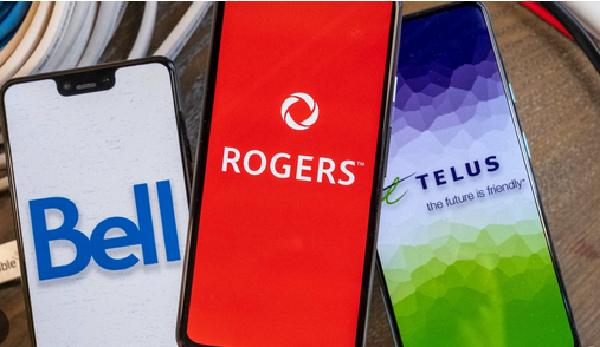Canadian telecom operators softly increase cellphone plan rates after years of better mobile deals
After years of declining rates for cellphone plans, Canadian telecoms are raising certain add-on fees and plan prices.
In April, Fido, a cellular brand owned by Rogers Communications Inc. RCI-B-T +0.69%increase
, changed the terms of its contract for new customers to include a $5-a-month charge to use a hot spot from their cellphone to share data with other devices.
“Current Fido customers with existing plans are not impacted by the change to hot spot offerings,” said Rogers spokesperson Zac Carreiro.
The company did not respond to questions about why it was introducing this fee, or whether it would apply to its other flanker brands. The company’s website notes that its Rogers 5G plans include hot spot access.
BCE Inc. Bell Canada said all of its current plans across its brands include hot spot and tethering at no additional charge.
Telus Corp. said it does not currently charge customers an extra fee to hot spot or tether data from their devices through either its main brand or flanker brands Koodo and Public Mobile.
Quebecor Inc. said it does not charge fees for hot spots for any of its brands.
Meanwhile, in recent months, prices for some bring-your-own-device plans have ticked upward.
For their 100-gigabyte plans, and after including credits for setting up automatic payments, Rogers and Bell both raised the price to $65 from $50 and $49, respectively. Bell said its price increased because a promotion ended. Telus also raised its price to $70 from $55.
Freedom Mobile charges $40 for its 100-gigabyte bring-your-own-device plan. But earlier this year, the company bumped up prices slightly for some of its cheaper options with less data.
This represents a slight reversal of a multiyear trend that has seen Canadians paying less for their plans. The competitive landscape has shifted in recent years, allowing many consumers to shop around for cheaper plans or extract better deals from their providers.
According to Statistics Canada, prices for cell services in March had fallen 8.8 per cent compared with the year prior, “due to lower prices for cellular phone plans amid industry-wide promotions.” In comparison, the consumer price index over all increased by 2.3 per cent.
In the past two years, cellphone plan prices have declined by roughly 25 per cent, the Canadian Radio-television and Telecommunications Commission says in a market report.
In order to attract customers, telecom providers have been offering larger data packages at lower prices. For example, 50-gigabyte plans averaged $40 in September, 2024, compared with double that price a year earlier, CRTC data show. This means that telecoms have been earning less for each gigabyte they sell.
Despite overall price declines in the past year, the CRTC said that many Canadians are reporting higher bills. “This may be explained by some Canadians paying for more data and faster speeds,” the regulator said.
In 2020, just five per cent of consumers had a cellphone plan with more than 50 gigabytes of data. By 2023, that had increased to 30 per cent, according to the CRTC.
Larger data plans have a dampening effect on prices. If a consumer pays the same for a plan with more data, Statscan would interpret this as a price cut. This is known as a quality adjustment, and it’s a standard practice in price index methodologies.
Some carriers have also increased their one-time connection fees, charged to new customers to set up plans and transfer data from one device to another.
Last summer, Telus raised its fee from $60 to $70. Spokesperson Kalene DeBaeremaeker said the company had done so “to help meet the rising costs of operations and customer service.”
And in recent months, both Rogers and Bell increased their activation fees by $5 to $75. Bell spokesperson Luc Levasseur attributed this to “rising operating costs and market shifts.”
Bell, Rogers and Telus waive this fee if the activation is done online.
Quebecor‘s connection fee is $45 for new connections and upgrades, a price that the company said it has maintained since acquiring Freedom Mobile from Shaw in 2023.
This article was first reported by The Globe and Mail














